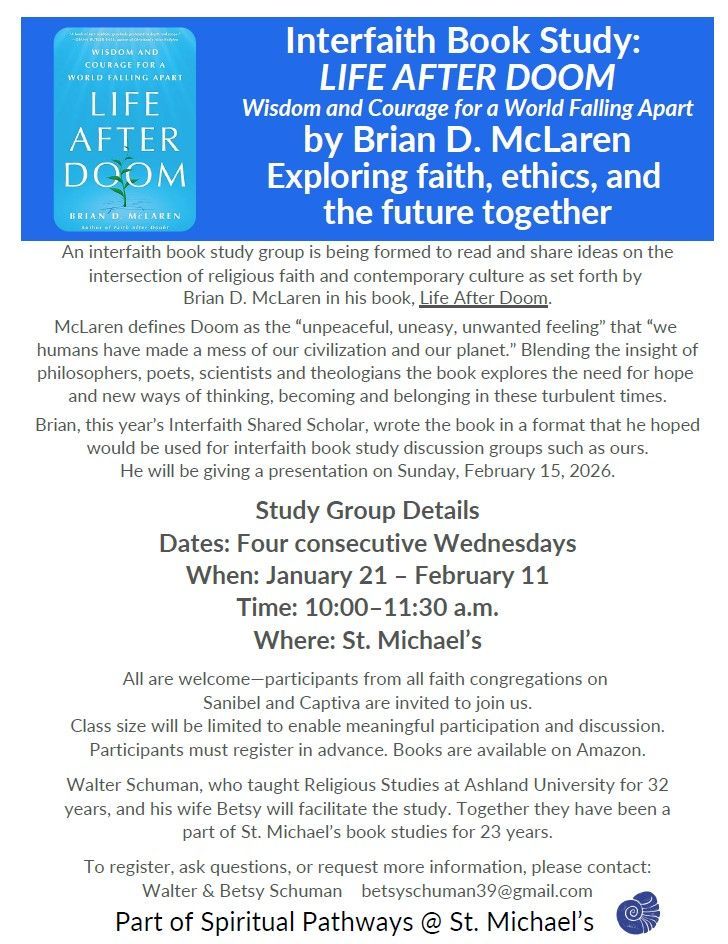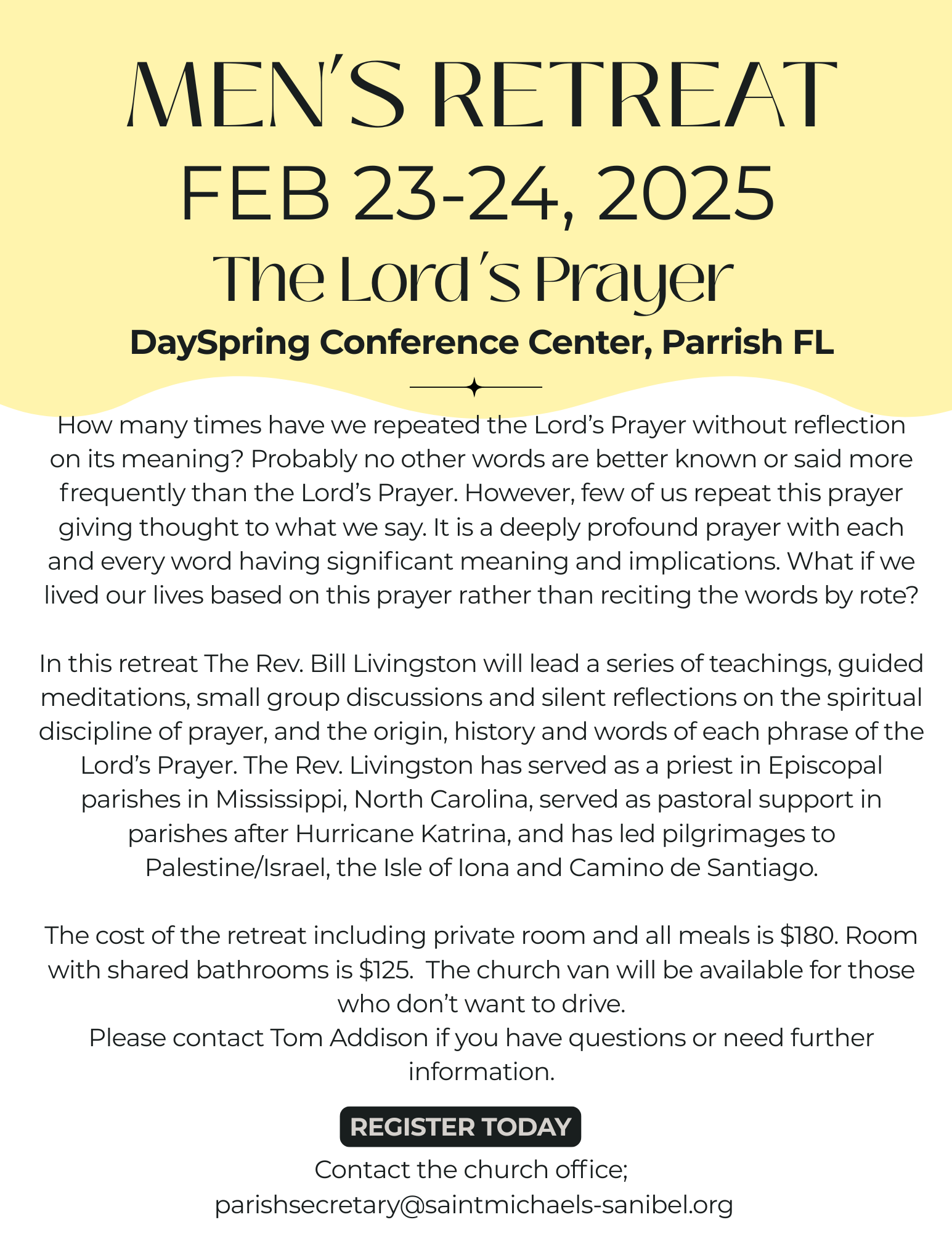Welcome to
Saint Michael & All Angels
Episcopal Church
2304 Periwinkle Way
Sanibel Island, Florida
Saturday Service 5:00pm
social hour to follow
~~~~~~~~~~~~~~~~~~
Sunday Services
8:00 am &
10:30 am*
coffee hour to follow
(*will be livestreamed)
Wherever you are in life, there’s a place for you at St. Michael’s. We believe every person is created in the image of our loving God; that God's radically inclusive love excludes no one. Everyone is welcome here without exception.
We encourage you to explore our website, and join us for worship in person or online.
Email Fr. Bill if you have questions or simply stop by for a chat. Whatever method or frequency you choose to join us, you will always experience the warmth and welcoming that is the core of St. Michael's.

Spiritual Pathways
Practices for Embracing the Journey
Upcoming Events









What to Expect
"The Episcopal Church Welcomes you", and we mean it at St. Michael's; whether you're just visiting the island or searching for a community that will embrace you as you are.
Get Connected
Stay in the know; sign up below to receive updates from Saint Michael's:
I'd like to receive the Saint Michael's Newsletter:

Recurring Zoom Events
List of Services
-
Thursday Bible Study with the RectorList Item 2
Every Thursday at 10:00 a.m. Meeting by ZOOM . Bible study with the Rector is a lectionary-based Bible study, held every Thursday, using the scripture readings for the coming weekend.
-
Thursday Night Prayer Service
Everyone is welcome to our Thursday Evening Prayer Service. In the Episcopal Church this is called “Compline", or "Night Prayer". It is a small, quiet serve of prayers at the end of the day.
Thursdays, 6 p.m. on Zoom
Phone-in (no video): 1-646-931-3860
Enter Meeting ID: 835 8757 2066
-
Monthly Men's Fellowship
Hybrid Men's Fellowship meet via Zoom and in person @ St. Michaels, Sanibel.
Check the Friday Brief each week for meeting dates and times.
28
Noah's Ark Thrift Shop - Closed
8am Worship Service
10:30am Worship Service
Show all
29
Noah's Ark Thrift Shop - Closed
30
Noah's Ark Thrift Shop - Closed
1:30pm No Staff Meeting
31
Noah's Ark Thrift Shop - Closed
New Year's Eve (Church Office Closed)
10am F.I.S.H. of SanCap - Counseling
11:30am Cancelled: Service of Holy Eucharist
2:15pm Cancelled: "Love First" After School Program
Show all
1
Noah's Ark Thrift Shop - Closed
New Year's Day (Church Office Closed/no mail)
9am Cancelled - Yoga Class
10am Cancelled: Bible Study
1pm Santiva Islanders Community Activity - Bridge
1pm ZOOM: Digital Ministry
6pm Cancelled: Evening Prayer (Compline)
Show all
2
Noah's Ark Thrift Shop - Closed
10am Grief Support Group - "Beyond the Broken Heart"
7:30pm AA Meeting
Show all
3
9am Yoga Class
10am Noah's Ark Thrift Shop - Open (
5pm Worship Service
Show all
4
8am Worship Service
10:30am Worship Service
5
9am CCMI EveryDay Cafe Volunteer Day
6
1:30pm Staff Meeting
7
8am ZONTA
10am F.I.S.H. of SanCap - Counseling
11:30am Service of Holy Eucharist
2:15pm "Love First" After School Program
Show all
8
9am Yoga Class
10am ZOOM: Bible Study
1pm Santiva Islanders Community Activity - Bridge
1pm Hybrid: Outreach Ministry
6pm Evening Prayer (Compline)
Show all
9
Volunteer Day at Misión Peniel
10am Grief Support Group - "Beyond the Broken Heart"
7:30pm AA Meeting
Show all
10
9am Island Woods HOA
9am Yoga Class
11am Overflow (Rear) Parking for City Hall Time Capsule Reinstallation
5pm Worship Service
Show all
11
8am Worship Service
10:30am Worship Service
12pm Gather Round the Table
5pm Messy Church
Show all
12
11am ECW Board Meeting
12:15pm Women's Fellowship
3pm Spiritual Growth: Later Life Reflection Group
5:30pm FISH Workshop: Budget (part 1)
Show all
13
8:30am HYBRID: Men's Fellowship
1:30pm Staff Meeting
5pm Neighborhood Gathering (SP)
Show all
14
8:30am Community Engagement
10am ZOOM: Pastoral Care Ministry
10am F.I.S.H. of SanCap - Counseling
11:30am Service of Holy Eucharist
2:15pm "Love First" After School Program
Show all
15
9am Yoga Class
10am ZOOM: Bible Study
1pm Santiva Islanders Community Activity - Bridge
1pm Vestry Meeting
5pm Neighborhood Gathering (FMY)
6pm Evening Prayer (Compline)
Show all
16
10am Grief Support Group - "Beyond the Broken Heart"
7:30pm AA Meeting
17
9am Yoga Class
5pm Worship Service
18
8am Worship Service
10:30am Worship Service
12pm Gather Round the Table
Show all
19
Martin Luther King Jr. Day (Church Office Closed/no mail)
11am ZOOM: Christian Formation Ministry
20
1:30pm Staff Meeting
5pm Neighborhood Gathering (SP)
21
8am ZONTA
10am Spiritual Pathways
10am Interfaith Book Study
10am F.I.S.H. of SanCap - Counseling
11:30am Service of Holy Eucharist
2:15pm "Love First" After School Program
Show all
22
9am Yoga Class
10am ZOOM: Bible Study
10:45am F.I.S.H. Workshop: Frauds, Scams & Identity Theft
1pm Santiva Islanders Community Activity - Bridge
5pm Neighborhood Gathering (FMY)
6pm Evening Prayer (Compline)
Show all
23
2026 Parish Retreat
10am Grief Support Group - "Beyond the Broken Heart"
7:30pm AA Meeting
Show all
24
9am Cancelled: Yoga Class
5pm Worship Service
25
8am Worship Service
10:30am Worship Service
12pm Gather Round the Table
Show all
26
9am CPR/AED Training
5:30pm FISH Workshop: Budget (part 2)
27
8:30am HYBRID: Men's Fellowship
1:30pm Staff Meeting
5pm Neighborhood Gathering (Snb)
Show all
28
8am Cfi leadership
10am Interfaith Book Study
10am F.I.S.H. of SanCap - Counseling
11:30am Service of Holy Eucharist
2:15pm "Love First" After School Program
Show all
29
9am Yoga Class
10am ZOOM: Bible Study
1pm Santiva Islanders Community Activity - Bridge
5pm Neighborhood Gathering (Snb)
6pm Evening Prayer (Compline)
Show all
30
9am Dress Rehearsal
10am Grief Support Group - "Beyond the Broken Heart"
7:30pm AA Meeting
Show all
31
9am Yoga Class
11am Memorial Service for Lee A. Almas
5pm Worship Service
Show all





